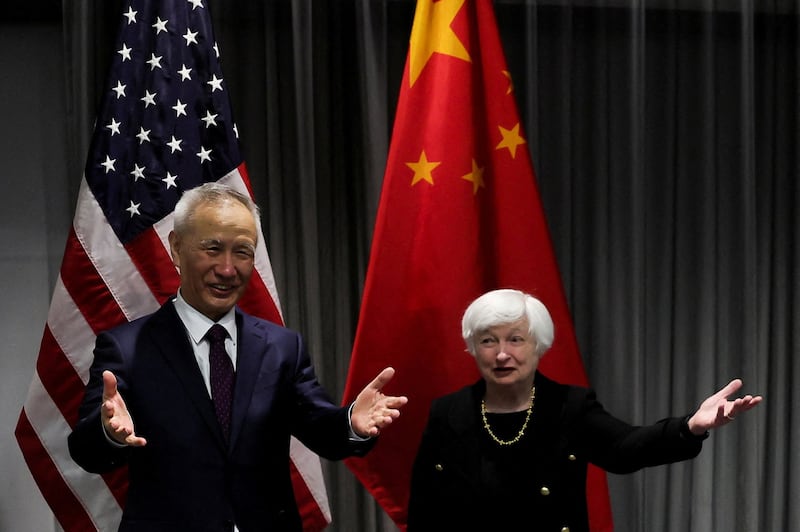Treasury Secretary Janet Yellen will travel to Beijing Thursday, making her the second cabinet-level official to visit China this year and signifying that China and the U.S. are talking again – or at least trying to.
Yellen’s trip will stress the importance for both countries “to responsibly manage our relationship, communicate directly about areas of concern, and work together to address global challenges,” the Treasury Department said in a statement on Sunday.
The relationship between China and the U.S. has been unraveling as the two countries spar over trade, technology transfers, Taiwan’s status quo, human rights issues, China’s professed support for Russia’s invasion of Ukraine and general superpower rivalry.
As the Biden administration considers additional restrictions of technology transfers by restricting the flow of chips used for artificial intelligence, Beijing has repeatedly indicated that it stands against all attempts to hold back its economic development.
China, which has assumed an increasingly provocative military posture in the Taiwan Strait and the South China Sea, has not ruled out taking Taiwan by military force.
On Monday, it announced restrictions on exporting gallium and germanium – metals that are crucial to the semiconductor, telecommunications and electric-vehicle industries – in an apparent tit-for-tat response to U.S. technology controls, but also probably in an effort to gain some leverage ahead of Yellen's visit.
Yellen undoubtedly wants to maintain a tough line while preserving the U.S.’s commercial and investment links with China. Chinese officials, on other hand, are fighting an unprecedented – in recent times – economic slowdown on their home turf and are hopeful that they can preserve trade with the West while also appearing tough.
Despite the costs
In a recent interview with MSNBC, speaking of her upcoming visit to China, Yellen said, "What I've tried to make clear is that the United States is taking actions and will continue to take actions intended to protect our national security interests, and we'll do that even if it imposes some economic cost on us."
She added that the U.S. believes that “a healthy economic relationship, healthy competition benefits both American businesses and workers and Chinese businesses and workers. This is something that is possible and desirable.”

Yellen will be in Beijing from Thursday through Sunday and will meet with senior Chinese officials and U.S. business people, but not Chinese president Xi Jinping, saida senior Treasury official on Sunday, providing the details of Yellen's trip on the condition of anonymity.
Yellen aims to build on U.S. Secretary of State Antony Blinken's recent visit to Beijing, where he met President Xi, and tried to jumpstart communication on areas of shared interest, despite disagreements that are not easily resolved, the official said.
The limited success of Blinken's trip was overshadowed by President Joe Biden's subsequent and apparently off-the cuff remark at a fundraiser that Xi is a " dictator," a comment he refused to walk back, saying later it was "just not something I'm going to change very much."
Tit for tat
Meanwhile, The Wall Street Journal reported that Yellen has repeatedly called for multinational companies to shift supply chains outside of China, while Congress has created new subsidies motivating them to do so.
China, in turn, apart from the latest restrictions on metals used in high technology, on Saturday implemented a new foreign relations law that theoretically gives it wide-ranging powers to act against anyone acquiring information that could possibly involve national security.
The ambiguity of the law has led critics to say that having almost any information might be considered of security interest to Beijing.
On Friday, the U.S. State Department issued an updated travel advisory that said Americans should reconsider any travel to China due to "arbitrary enforcement of local law," "exit bans" and "wrongful detentions."
“U.S. citizens might only become aware of an exit ban when they attempt to depart the PRC, and there may be no available legal process to contest an exit ban,” the travel advisory said, in a reference to the formal name of China, the People’s Republic, adding that “relatives, including minor children” may also be prevented from leaving China.
Cautious approach
On this trip, Yellen – who has previously said that a complete decoupling of the U.S. and Chinese economies would be “disastrous” – will be aiming to get to know her new counterpart, Chinese Vice Premier He Lifeng, an economist who is mainly known as a longtime supporter of Xi.
Providing a glimpse into her mindset ahead of the trip, Yellen said in a speech at Johns Hopkins University's School of Advanced International Studies in Washington, in April this year, that the U.S. needs to cooperate with China in key areas like debt overhang and climate change.
“First, we will secure our national security interests and those of our allies and partners, and we will protect human rights,” Yellen said. “We will not hesitate to defend our vital interests. Even as our targeted actions may have economic impacts, they are motivated solely by our concerns about our security and values.”
She added that the U.S. is not out to gain advantage “or stifle China's economic and technological modernization,” words that are unlikely to get much traction in Beijing but may be seen as a peace offering and the basis of a resumption of talks between the two powers.
Edited by Mike Firn.

